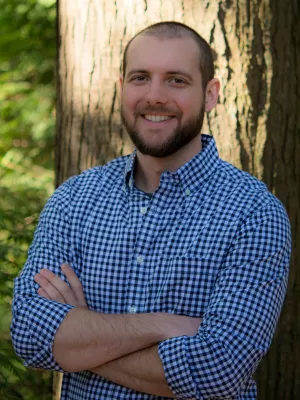
BIG lab with broad aims
Professor from UofT Mississauga’s Department of Psychology focuses on studies of gender expression and works to instill more social acceptance towards youth who are gender diverse

Friday, March 31 is International Transgender Day of Visibility – an important day on the calendar to celebrate people who are transgender and raise awareness of the discrimination they face – but for Doug VanderLaan gender expression is a focus year round.
“I don't know that my lab would necessarily want to put ourselves front and center on a day like Transgender Day of Visibility because actually it's a day for trans and gender-diverse people to be front and center,” says VanderLaan, an associate professor in UTM’s Department of Psychology.
“But my lab keeps an eye out for potential campus events in which to participate, and I do have a plan for my cross-cultural psychology class, which will be held on that day. I will talk about research on gender-diverse people and different cultures, as well as variability and attitudes across cultures. So that's how I'll shine the light on it in the classroom.”
On the latest episode of VIEW to the U, VanderLaan talks about his work in the Biopsychosocial Investigations of Gender Laboratory, or BIG lab for short.
In the BIG lab, VanderLaan has several lines of research running, including a “Neuroimaging Study of Transgender Adolescents and Adults” project, which investigates brain development and unique brain characteristics among Canadian adolescents who experience gender dysphoria, which is “distress due to an incongruence between birth-assigned and experienced gender” (from the BIG lab website).
In his broad program of research, Vanderlaan also investigates the variations of gender expression in ongoing cross-cultural studies with collaborators in Thailand and China, and considers how Canada compares to some other societies' acceptance and notions of gender expression in youth and adolescents.
His lab explores potential interventions to decrease mental health risk in youth and broaden children’s acceptance of gender diversity, which has the potential for longer lasting acceptance. This is something that VanderLaan says can help improve mental health risks and the numbers of kids facing those challenges are likely much more common than people might think.
By his estimation, about one in every 50 children in Canadian society are gender diverse or whose gender-role behaviour is inconsistent with sex assigned at birth.
“And the rate of mental health challenges is actually about double what it would be in children who are not gender diverse,” says VanderLaan.
“So, just doing some simple math, we are talking about thousands of children – two or three in every school, probably across the country – who are likely going unnoticed because they are not attending clinics.”
VanderLaan says there are professionals working with youth who are up to date with the latest literature, but the fact is there are not enough clinics or access to mental health practitioners to cover this vulnerable population. He posits two courses of action to improve the situation.
“We need educators, parents, anyone who basically has some involvement in the lives of children on a regular basis, to recognize that this issue exists, and be somewhat prepared to help children navigate situations that are leading to increased mental health challenges, which seem to be situations that involve things like they're being bullied, or even just, their parents have more traditional attitudes towards gender, and they don't necessarily accept their child's gender diverse expression,” says VanderLaan.
And second, related to his “beyond the clinic” work is striving for more general acceptance and understanding.
“If the source of a lot of the mental health challenges for these youth is actually socially determined things like not being accepted or being discriminated against, then likely the way to ameliorate this increase in mental health risk would be to just encourage more societal acceptance. We have been exploring ways in my lab that you can actually lead children to be more accepting of gender-diverse children.”
A truly interdisciplinary program of research, VanderLaan’s work is supported by many different funding agencies including Canada’s tri-council – the Canadian Institutes of Health Research, Natural Sciences and Engineering Research Council, and the Social Sciences and Humanities Research Council – as well as Brain Canada, the American Institute of Bisexuality, the Centre for Addiction and Mental Health, and the UofT Mississauga. In addition, his scholarly credentials place him in an elite league of academics: based on Expertscape's PubMed-based algorithms, he is among the top researchers in his field.
Resources
- Listen to the full interview with Professor Doug VanderLaan on VIEW to the U podcast or read the transcript: the interview includes more about Doug’s work, his academic origin story, and more.
- Visit the BIG lab website
- See the profile UTM prof recognized globally for expertise in gender identity (November 2021)
